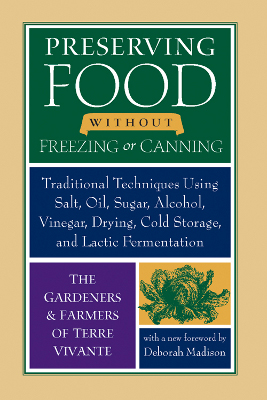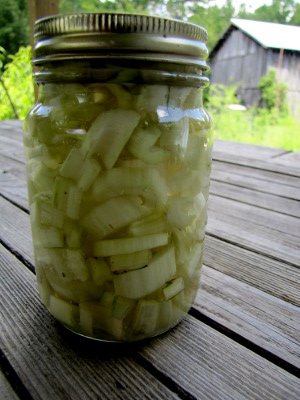
Preserving Food Without Freezing or Canning
 Preserving
Food Without Freezing or Canning is a fascinating and
thought-provoking book that has an entirely different feel from most
modern homesteading books. The project started when a French
gardening magazine asked its readers to share old-fashioned fruit and
vegetable preservation recipes, so the resulting compilation feels a
bit like an oral history turned into a cookbook.
Preserving
Food Without Freezing or Canning is a fascinating and
thought-provoking book that has an entirely different feel from most
modern homesteading books. The project started when a French
gardening magazine asked its readers to share old-fashioned fruit and
vegetable preservation recipes, so the resulting compilation feels a
bit like an oral history turned into a cookbook.
When you find a copy, I
recommend that you start by flipping to the appendix, which in many
ways is the most valuable part of the book. I've spent years
slowly figuring out which preservation technique works best for each
fruit and vegetable, and the authors of this book have created a quick
tabular view of that information. For example, they show that
onions are best stored whole on the shelf, but that you can also
preserve them by drying, lactic fermenting, or adding vinegar.
 In general, the authors
recommend drying fruits and lactic fermenting most vegetables --- I
definitely agree with the former and might have to get over my
anti-pickle sentiment enough to try the latter. In fact, after
reading through the entire lactic fermentation section, I settled on
Swiss chard ribs as a good starter recipe since the authors of the
recipe note "Swiss chard ribs are not acidic. Our children dread
lacto-fermented green beans, but they love the milder taste of Swiss
chard." I'll let you know if Mark and I feel the same way once
our first lactic fermentation experiment is ready at the end of August.
In general, the authors
recommend drying fruits and lactic fermenting most vegetables --- I
definitely agree with the former and might have to get over my
anti-pickle sentiment enough to try the latter. In fact, after
reading through the entire lactic fermentation section, I settled on
Swiss chard ribs as a good starter recipe since the authors of the
recipe note "Swiss chard ribs are not acidic. Our children dread
lacto-fermented green beans, but they love the milder taste of Swiss
chard." I'll let you know if Mark and I feel the same way once
our first lactic fermentation experiment is ready at the end of August.
Want more in-depth information? Browse through our books.
Or explore more posts by date or by subject.
About us: Anna Hess and Mark Hamilton spent over a decade living self-sufficiently in the mountains of Virginia before moving north to start over from scratch in the foothills of Ohio. They've experimented with permaculture, no-till gardening, trailersteading, home-based microbusinesses and much more, writing about their adventures in both blogs and books.
Want to be notified when new comments are posted on this page? Click on the RSS button after you add a comment to subscribe to the comment feed, or simply check the box beside "email replies to me" while writing your comment.

Mom --- You're right on track --- sauerkraut is the one kind of lactofermentation that most folks are familiar with. Salt is what keeps the good bacteria outcompeting the bad bacteria in these situations, but I didn't have to add that much --- half a teaspoon for my experimental pint.
So glad to hear you're eating up those dried summer squash. I made way too many last year....
Don --- I may have to try lacto-fermented cucumbers. We really don't like pickles, but part of that is that the usual spice blend isn't up our alley. Presumably we could mess with the spices if we wanted, maybe using basil instead? I need to do some more research before trying it, though, because I don't entirely understand what I can and can't lacto-ferment without killing myself.
We'll definitely post a followup about the swiss chard ribs in a few weeks! Meanwhile, you might like to try our favorite recipe --- cut the leaves up, add some green onion leaves, and saute with oil and balsamic vinegar. Yum!